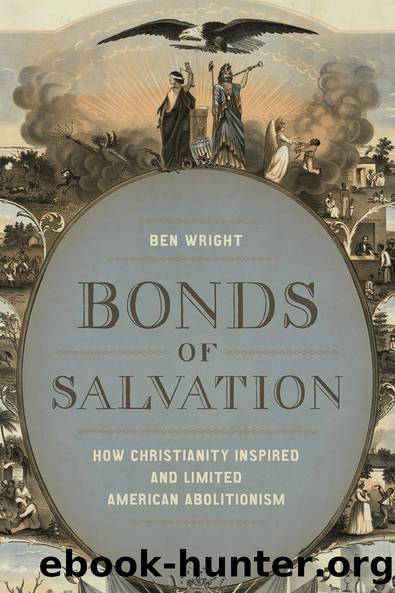Bonds of Salvation by Ben Wright

Author:Ben Wright [Wright, Ben]
Language: eng
Format: epub
ISBN: 9780807173893
Barnesnoble:
Publisher: Louisiana State University Press
Published: 2020-12-16T00:00:00+00:00
Abolitionist Opposition to Colonization
White abolitionist opposition to colonization took much longer to solidify than the attacks emanating from proslavery southerners. Even the Quaker abolitionist Benjamin Lundy supported colonization in the 1820s. Through his Genius of Emancipation newspaper and his own organizing, he aided the American Colonization Society as well as organized his own colonization schemes. Despite Lundyâs support, abolitionists would turn against the ACS by the 1830s.72
The Quaker minister and editor Elisha Bates raised some of the earliest white abolitionist objections in 1822. Bates accused the ACS of illogical duplicity. How could Black Americans be both âthe pests of society, corrupted, and corruptingâ and then also be the agent of mass evangelism? Radicals like Bates increasingly mocked colonizationists who claimed that Black Americans were both depraved dangers to society and the ordained agents of African salvation.73
Most colonizationists ignored the obvious logical inconsistency in their rhetoric, while others argued that education was a means of transforming dangerous dregs into enlightened evangelists. Bates himself was concerned with transforming sinful souls into pious saints, as he spent most of his ministry working with troubled members of his monthly meeting rather than seeking to expand his local Quaker flock. For Bates, however, there was no purifying element to colonization. It is not a surprise that his attack on colonization concluded with the fear that the purifying opportunity to end American slavery was slipping away due to conversionist fantasy.74
The most serious challenge to colonization, however, came not from white radicals like Bates, but rather from Black Christians, who pushed back against the missionary logic of colonization from the very beginning. Ever since thousands of Black Philadelphians expressed their disapproval in early 1817, Black Americans had questioned whether the ACS would succeed in their promise of extending salvation. The pages of the Black newspaper Freedomâs Journal were rife with debate over colonization. John Russwurm, one of the paperâs founders and editors, eventually became a prominent Black colonizationist and emigrated to Liberia in 1829.75 But the paper mostly communicated the Black communityâs dual position of opposition to the ACS yet support for the missionary effort.
A June 1827 article claimed that the paper was âopposed to colonization in any shape, unless it be merely considered as a missionary establishment.â The article framed its critique primarily as a manner of missionary expediency. The author advocated sending missionaries to Africa, not colonists: âLet a single nation be converted through the instrumentality of a mission family, and they will become far better pioneers, in effecting the work of civilization, and salvation through the vast regions of Africa, than any colonists that are likely to emigrate to that country.â76
Some critics even blamed colonizationists for the death of missionaries. A March 1837 edition of the Colored American relayed explorersâ reports from South Africa that distinguished âthe sickly shores of Liberiaâ from âthe healthy interior.â The magazine blamed âthe colonization humbugâ for âthe blood of all the devoted missionariesâ who died from disease.77 If missionaries were sent individually, they might move into the salubrious interior rather than being stranded on coastal colonies.
Download
This site does not store any files on its server. We only index and link to content provided by other sites. Please contact the content providers to delete copyright contents if any and email us, we'll remove relevant links or contents immediately.
| United States | Abolition |
| Campaigns & Battlefields | Confederacy |
| Naval Operations | Regimental Histories |
| Women |
In Cold Blood by Truman Capote(3374)
The Innovators: How a Group of Hackers, Geniuses, and Geeks Created the Digital Revolution by Walter Isaacson(3144)
Steve Jobs by Walter Isaacson(2889)
All the President's Men by Carl Bernstein & Bob Woodward(2362)
Lonely Planet New York City by Lonely Planet(2216)
And the Band Played On by Randy Shilts(2197)
The Room Where It Happened by John Bolton;(2150)
The Poisoner's Handbook by Deborah Blum(2131)
The Innovators by Walter Isaacson(2096)
The Murder of Marilyn Monroe by Jay Margolis(2094)
Lincoln by David Herbert Donald(1981)
A Colony in a Nation by Chris Hayes(1926)
Being George Washington by Beck Glenn(1907)
Under the Banner of Heaven: A Story of Violent Faith by Jon Krakauer(1788)
Amelia Earhart by Doris L. Rich(1687)
The Unsettlers by Mark Sundeen(1682)
Dirt by Bill Buford(1669)
Birdmen by Lawrence Goldstone(1662)
Zeitoun by Dave Eggers(1643)
